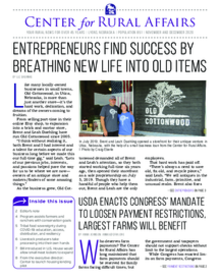Editor's Note
At the Center for Rural Affairs, the majority of our staff have worked from home for eight months now and will continue to do so for the foreseeable future. Like many of you, I have adjusted to my remote rural life.
I am thankful that I live in a small town where I can continue my daily routine of a socially distanced walk. My dog loves visiting our community park to watch the geese and sniff where the frogs and turtles have traveled.
For this edition, we chose stories to highlight our core value of “PROGRESS that strengthens rural communities, small businesses, and family farms and ranches.” Our rural communities are adjusting and small businesses are pivoting. This pandemic has done a number on us, but time and time again, those who live in rural areas show they are resilient. We are making progress.
You’ll read about a ranch that started meat processing classes, a small business doing its part to keep its town thriving, and Tribal communities coming up with new ways to access and grow their own food.
And, perhaps the most exciting announcement is in our executive director’s essay. I’ll let you continue reading to find out more.
Inside this Issue
Entrepreneurs find success by breathing new life into old items—Like many locally-owned businesses in small towns, Old Cottonwood, in Utica, Nebraska, is more than just another store—it’s the hard work, dedication, and dreams of the owners coming to fruition.
USDA enacts Congress’ mandate to loosen payment restrictions, largest farms will benefit—Who deserves farm payments? The Center for Rural Affairs has long maintained that farm payments should be reserved for family farms facing difficult times, but the government and taxpayers should not support checks without limit to the largest operations.
From the desk of the executive director: Center to launch housing lending pilot—Affordable housing plays an instrumental role in rural community vibrancy and local economic development. Homeownership increases family and community stability, supports local businesses, and boosts local schools.
Program assists farmers and ranchers with conservation goals—Signups are now open for the Conservation Stewardship Program (CSP), which has helped farmers and ranchers achieve conservation goals on their operations for nearly two decades.
Tribal food sovereignty during COVID-19: education, access, distribution, and resiliency—Across rural America, we have eased into new norms and routines. Each of us is attending to the impacts of COVID-19 on our friends, families, and communities as we reflect on these unprecedented times.
Livestock producers take processing into their own hands—Growing up, Dusty VanRenan and Amanda Meier knew a thing or two about processing their own livestock.
Bill introduced in U.S. House would allow small meat lockers to expand—Legislation introduced in late September supports local business and livestock producers.


